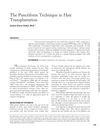
There are many ways to treat Polycystic Ovary Syndrome, including lifestyle changes, surgery, and various medications, but more research is needed for better treatments.
November 2020 in “AACE clinical case reports” A woman's severe male hormone excess was caused by a small, hard-to-find ovarian tumor.
March 2023 in “Anais Brasileiros De Dermatologia” Topical minoxidil is the best-supported treatment for female hair loss, but personalized plans are needed.
January 2019 in “Journal of Dermatology and Dermatologic Surgery” Wearing headcovers doesn't affect male-pattern hair loss severity.
 34 citations,
June 2010 in “Archives of Disease in Childhood”
34 citations,
June 2010 in “Archives of Disease in Childhood” Menstrual disorders are common in adolescents and can be influenced by weight, activity, and health issues, requiring careful evaluation and more research for effective treatment.
 4 citations,
May 2005 in “Seminars in Plastic Surgery”
4 citations,
May 2005 in “Seminars in Plastic Surgery” Carlos Oscar Uebel developed a hair transplant method that looks natural, has low risk, and shows full growth in 6-12 months.
 2 citations,
July 2020 in “Trends in Urology and Men's Health”
2 citations,
July 2020 in “Trends in Urology and Men's Health” More men are getting cosmetic surgery, with Botox and hair removal being popular, but these procedures have risks.
 October 2022 in “Journal of advanced research in medicine”
October 2022 in “Journal of advanced research in medicine” A woman with Sheehan syndrome improved with hormone treatment.
 2 citations,
October 1997 in “Dermatologic Clinics”
2 citations,
October 1997 in “Dermatologic Clinics” The document concludes that advancements in hair restoration surgery have led to more natural results and patient satisfaction, with hope for future improvements in treatment.
 17 citations,
February 2020 in “Journal of Pediatric and Adolescent Gynecology”
17 citations,
February 2020 in “Journal of Pediatric and Adolescent Gynecology” Early medical support for transgender youth is important for their health, with low regret for gender-affirming hormone use and a need for knowledgeable care providers.
 9 citations,
January 2015 in “Springer eBooks”
9 citations,
January 2015 in “Springer eBooks” The document concludes that managing PCOS involves treating symptoms, regulating periods, and reducing health risks, with specific medications for fertility and metabolic issues.
 January 2024 in “International Journal of Health Science”
January 2024 in “International Journal of Health Science” Hormonal implants have many side effects that often outweigh their benefits.
 1 citations,
May 2023 in “Scientific Reports”
1 citations,
May 2023 in “Scientific Reports” Most hospitalized COVID-19 survivors in the study experienced long-term symptoms, affecting their daily life and mental functions.
 October 2023 in “Journal of Preventive Diagnostic and Treatment Strategies in Medicine”
October 2023 in “Journal of Preventive Diagnostic and Treatment Strategies in Medicine” Low ferritin and Vitamin D levels may cause hair loss after COVID-19.

Accurate diagnosis and timely, tailored treatments improve outcomes in obstetrics and gynecology.
 4 citations,
December 2014 in “European Journal of Chemistry”
4 citations,
December 2014 in “European Journal of Chemistry” Iron chloride helps create compounds that could be useful in medicine, like treating hair loss.
 9 citations,
November 2016 in “Journal of medical science and clinical research”
9 citations,
November 2016 in “Journal of medical science and clinical research” Only 22% of teenage girls in the study knew about PCOS, despite many having symptoms.
 6 citations,
September 2019 in “Journal of Cosmetic Dermatology”
6 citations,
September 2019 in “Journal of Cosmetic Dermatology” Laser treatment effectively increases hair density and thickness in androgenic alopecia.
 89 citations,
November 2014 in “Medical Clinics of North America”
89 citations,
November 2014 in “Medical Clinics of North America” Eating 500 fewer calories a day and making lifestyle changes can improve PCOS symptoms and reduce diabetes risk; more research is needed on its causes and treatments.
 14 citations,
February 2000 in “Feminism & Psychology”
14 citations,
February 2000 in “Feminism & Psychology” The entry showed that PCOS negatively affects women's self-image and is worsened by societal expectations, suggesting a need for more feminist attention to the condition.
 258 citations,
July 2016 in “Reproductive Biology and Endocrinology”
258 citations,
July 2016 in “Reproductive Biology and Endocrinology” The document concludes that insulin resistance is key in PCOS development and early treatment is crucial to prevent complications.
 26 citations,
October 2016 in “Clinics in Dermatology”
26 citations,
October 2016 in “Clinics in Dermatology” Hormonal treatments can improve acne, but they come with potential side effects and risks.
 24 citations,
May 2018 in “Journal of Molecular Endocrinology”
24 citations,
May 2018 in “Journal of Molecular Endocrinology” The spiny mouse is a unique menstruating rodent that can help us understand menstruation and reproductive disorders.

Early detection and comprehensive treatment of PCOS are crucial due to its long-term health impacts and associated risks.
 April 2024 in “Canadian Women s Health Today”
April 2024 in “Canadian Women s Health Today” PCOS treatment focuses on lifestyle changes and specific medications to manage symptoms and complications.

The conclusion is that a more comprehensive and precise approach is needed for diagnosing PCOS to address its broader health risks.
 343 citations,
December 2008 in “Endocrine Reviews”
343 citations,
December 2008 in “Endocrine Reviews” Metformin helps with menstrual cycles and insulin levels in PCOS but is less effective for hair growth, diabetes prevention, and weight loss, and may improve fertility and reduce diabetes risk.
 198 citations,
July 2011 in “Cochrane library”
198 citations,
July 2011 in “Cochrane library” Lifestyle changes can improve body composition, excess male hormone levels, and insulin resistance in women with PCOS.
 61 citations,
January 2015 in “Hormones”
61 citations,
January 2015 in “Hormones” Liraglutide caused significant weight loss in some obese women with PCOS, especially those with severe obesity and insulin resistance.
 32 citations,
January 2018 in “American Journal of Clinical Dermatology”
32 citations,
January 2018 in “American Journal of Clinical Dermatology” Hormone therapy affects hair growth in transgender individuals, with testosterone potentially causing hair loss in trans men and estrogen reducing facial/body hair in trans women; treatment options vary.


























